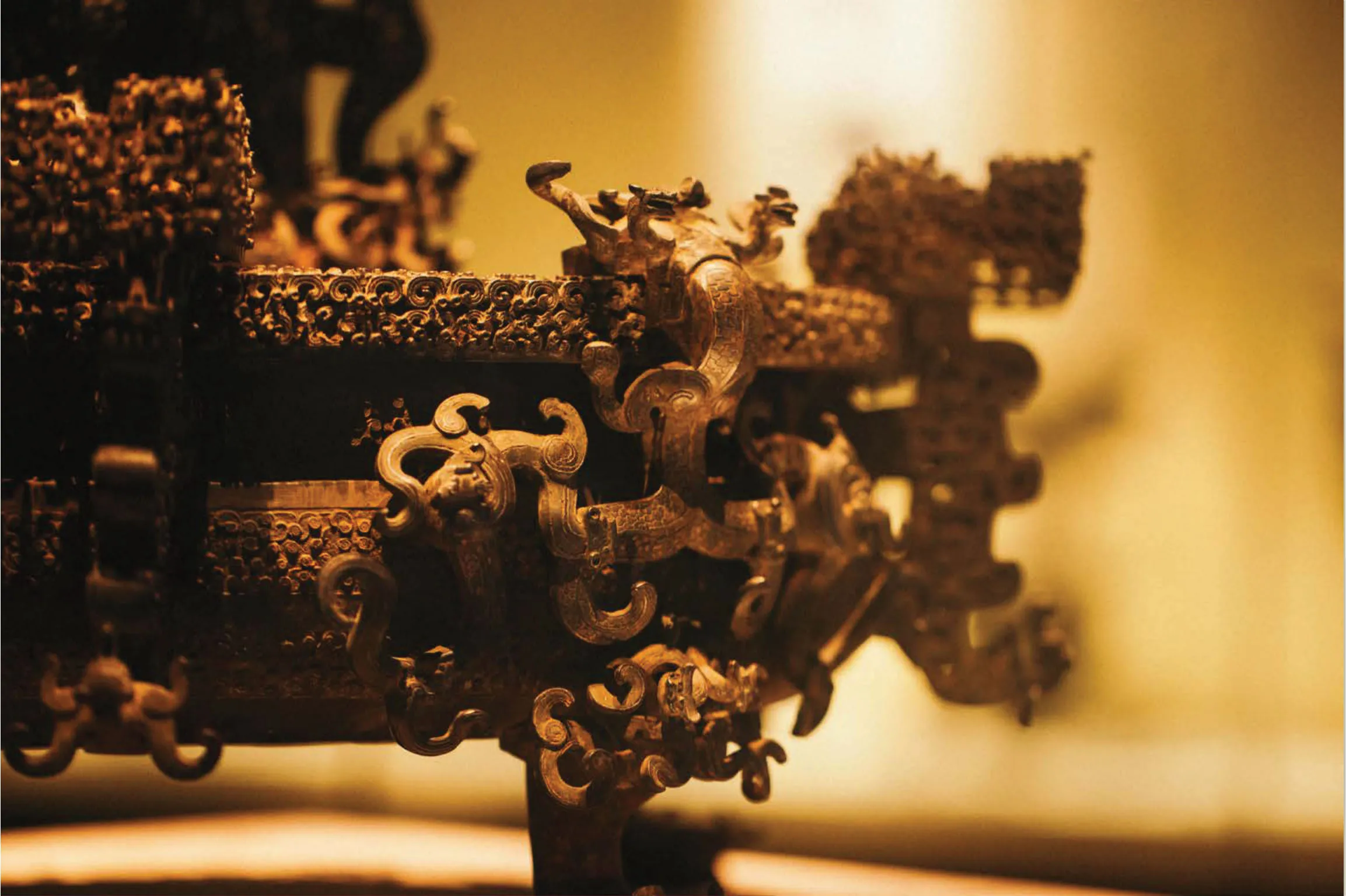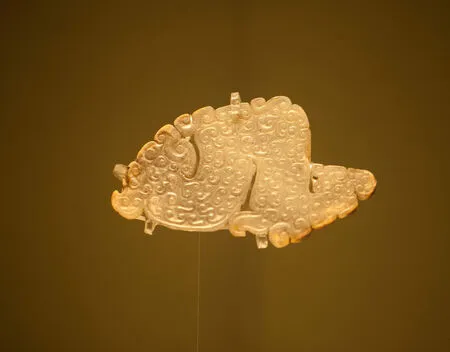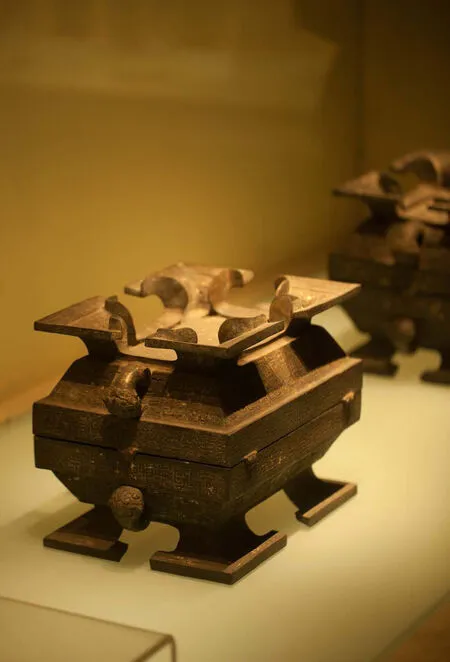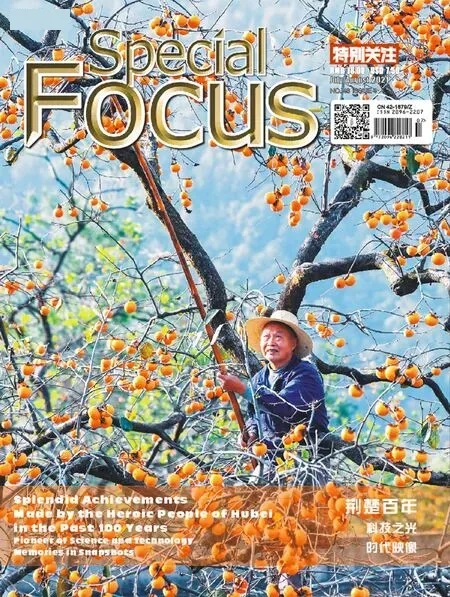The Chime-bells’ International Influence
Text by Liu Yishan Edited by He Sai &Bai Ning Photos by Su Zhuolin
Yehudi Menuhin,a renowned music master once exclaimed:“Ancient Greek musical instruments were all made of wood.They have not been preserved to this day.We can no longer hear the sound of ancient Greek musical instruments.Only the chime-bells of Marquis Yi of Zeng from China can reproduce the music of more than 2400 years ago.”
After listening to the “Ode to Joy” played by the chime bells,the world-famous Italian operatic tenor Luciano Pavarotti saluted to the chime-bells:“Lunga vita alla musica (Long live the music)! ”
The chimes have the capacity of playing the tones of all the keys on a modern piano,yet they were born more than 2000 years earlier than the piano.It is undoubtedly worthy of being regarded as a rare treasure in the music world and a miracle in the history of world civilization.
To enable people across the world to appreciate the marvel of chimes,since 1992,the chimes of Marquis Yi of Zeng have been brought to many countries and played an important role in China’s friendly ties with countries all over the world.

Delicate details and intricate patterns on the zun and pan,a set of wine vessels excavated from the tomb of the Marquis Yi of Zeng.曾侯乙尊盘纹饰细密复杂,巧夺天工。
In celebration of the 20th anniversary of the normalization of diplomatic relations between China and Japan,the Hubei Provincial Museum held a special exhibition of cultural relics unearthed from the tomb of Marquis Yi of Zeng in Japan at the invitation of the Tokyo National Museum of Japan and the Sino-Japan Cultural Exchange Association.
During the exhibition,the Chime Orchestra presented 8 performances each day.The famous songs “Chu Shang,”“Sakura,” and “Four Seasons”which are familiar tunes in both China and Japan,intoxicated the audience as they listened to the beautiful tones flowing from the ancient chimes.
In the concert hall,all the audience stood and listened to the music to show their respect for the Chinese chimes,except for a few elderly and disabled people sitting in chairs.
The Chinese chimes instantly became popular in Japan.Even Emperor Akihito of Japan was drawn to the performance of the Chinese chimes.
On the afternoon of May 1,1992,Emperor and Empress Akihito walked into the Chime Recital Hall.After listening to the song “Sakura” played on the chimes,they felt extremely cordial.The emperor said:“On the 20th anniversary of the normalization of Japan-China relations,I am deeply grateful for such a performance!”
享誉世界的音乐大师梅纽因曾说:“古希腊的乐器都是木制的,没有保存到今天,我们再也听不到古希腊乐器的声音。只有中国的曾侯乙编钟,还能把2400 多年前的乐音再现我们面前。”
世界著名歌唱家帕瓦罗蒂听完编钟演奏的《欢乐颂》后,朝着编钟高呼:“音乐万岁!”
曾侯乙编钟能够演奏出现代钢琴上所有键的音响,却比钢琴早诞生了2000 多年,不愧为稀世珍宝,不愧为世界文明史上的奇迹。
为了让世界人民分享编钟的神奇,从1992年起,曾侯乙编钟就走出了国门,在中国与世界各国的交往中起到了很好的桥梁作用。
为庆祝中日邦交正常化20 周年,受日本东京国立博物馆、中日文化交流协会邀请,湖北省博物馆赴日举办曾侯乙墓出土文物特别展,曾侯乙编钟等古乐器随展并演奏。
期间,编钟乐团每天为观众演奏8 场,从古代编钟中流淌出的中日两国人民熟悉的名曲《楚商》《樱花》《四季》等,让听众陶醉。
演奏大厅里,除少数老人和残疾人坐在折叠椅上外,其他观众都站着听,以示对中国编钟的崇敬与尊重。
中国编钟在日本热起来了。日本明仁天皇主动提出要听中国编钟演奏。
1992年5月1日下午,天皇偕皇后步入编钟演奏厅,当听完编钟演奏的《樱花》乐曲后,他们倍感亲切,天皇表示:“在日中邦交正常化20 周年之际,举办这样的演奏,我深表感谢!”
他还告诉家人,曾侯乙墓出土的文物特别是编钟等乐器很好看,不要错过。此后,德仁皇太子和天皇的二儿媳都去听了编钟演奏。
日本公明党前委员长竹入义胜倾听了曾侯乙编钟演奏后留言:“神器出仙乐,这是你们民族的光荣和骄傲。”
1999年6月13日,美国前国务卿基辛格博士利用在武汉商谈合作项目的机会,带领他的10 余位同事到湖北省博物馆参观。
基辛格曾于1982年和1996年来过湖北省博物馆,对许多著名文物很熟悉。他像一位导游,给同伴们介绍这些“大酒缸”“古代冰箱”“烤炉”等中国古董。
在编钟演奏厅,曾侯乙编钟和着排箫、箜篌等中国古代乐器,演奏了人们熟悉的《友谊地久天长》等乐曲,博得热烈的掌声和欢呼。
He also told his family that the cultural relics unearthed from the tomb of Marquis Yi of Zeng,especially the chimes and other musical instruments,were very beautiful and should not be missed.After that,Crown Prince Naruhito and the emperor’s second daughter-in-law all went to attend the chime performance.
After visiting and enjoying the performance,Yoshikatsu Takeiri,former chairman of the Central Executive Committee of the Komeito Party of Japan,commented:“What celestial music produced by magic artifacts!This is the glory and pride of your nation.”
On June 13,1999,Henry Kissinger,former US Secretary of State,took a dozen colleagues to visit the Hubei Provincial Museum during his business trip to Wuhan.
Dr.Kissinger formerly paid visits to the Hubei Provincial Museum in 1982 and 1996 and was familiar with many famous cultural relics there.He,as a tour guide,introduced to his companions Chinese antiques such as the giant wine jars as well as ancient refrigerators and ovens.
In the Chime Recital Hall,the chimes of Marquis Yi of Zeng and other ancient Chinese musical instruments such as panpipes and konghou played familiar musical compositions such as “Auld Lang Syne,” which won warm applause and cheers among the American visitors.
At the end of the visit,Kissinger wrote in the guest book:“It is a very high honor for me,and everyone to be able to make a visitand-study trip to such a beautiful place.I think I will have to come here another seven or eight times.”
At 9 o’clock on the evening of November 19,1980,the Hubei Provincial Museum,located on the shore of the East Lake in Wuhan,was serene.Singapore’s Prime Minister Lee Kuan Yew,together with his wife,daughter,and his entourage,came to the Hubei Provincial Museum to experience the chime-bells of Marquis Yi of Zeng.
Lee Kuan Yew’s beloved daughter,a master-degree student studying Chinese history,showed great enthusiasm for traditional Chinese culture.One day’s visit was tiring enough,but as soon as they arrived in front of the museum,they went straight to the chime exhibition hall.They were instantly in awe of the giant instruments in front of them.
Lee Kuan Yew’s daughter behaved like a child who was eager for knowledge and wanted to know everything about the chimes.
It was very late at night.After listening to some famous Chinese and foreign songs such as “Chu Shang,” “Silent Night,Holy Night,” and “Wave upon Waves on the Honghu Lake,” they still felt that they had not enjoyed the performance to the fullest.They didn’t leave until after 11 o’clock.
On September 5,1983,the temperature in Wuhan reached as high as 40℃.Former British Prime Minister Edward Heath and his delegation,braving the heat,came to the Hubei Provincial Museum.They listened with great interest to the ancient chime-bells and the musical performance copresented by the chime orchestra of the Wuhan Conservatory of Music and the museum.
Heath was so fascinated that immediately after the performance,he canceled his plan to visit East Lake and started talking with the performers.Heath praised the outstanding achievements in bronze casting and music exhibited by the chimes of Marquis Yi of Zeng and raised some questions.Finally he exclaimed:“Today is the happiest and most rewarding day of my trip,which has helped me solve the long-held puzzle in my heart.In many international violin and other music competitions in recent years,young Chinese musicians have always achieved excellent results and won many times.I always wonder,what’s the reason behind this? It suddenly dawned on me when I come here today,through viewing and listening.China had such high achievements in music and art more than 2400 years ago.With such a deeprooted background and such a long history,it is difficult for China not to be in a leading position in the world today.”
参观结束时,基辛格在留言簿上写道:“能够到这样一个美好的地方来游览学习,无论是对于我个人,还是对于所有人,都是一种很高很高的荣耀,我还要来七次、八次。”
1980年11月19日 晚 上9 点钟,位于武汉东湖之滨的湖北省博物馆静悄悄的。新加坡总理李光耀及夫人、女儿和随行人员来到湖北省博物馆,特地参观曾侯乙编钟。
李光耀的爱女,一位攻读中国历史的硕士生,对中国的传统文化表现出极大的热情。一天的访问已经够累了,可他们一到博物馆门前,就直奔编钟陈列厅。他们瞬间被眼前的庞然大物惊住了。
李光耀的女儿不像贵宾,倒像一名渴求知识的小学生,恨不得在这里把有关编钟的知识问个清楚明白。
夜深了,他们一口气听完了《楚商》《圣诞夜》《洪湖水浪打浪》等中外名曲,还是感觉意犹未尽,一直到11 点多钟才离开。
1983年9月5日,武汉气温高达40℃,英国前首相希思一行不畏炎热来到湖北省博物馆,他们饶有兴趣地聆听了武汉音乐学院与博物馆编钟乐团联合演奏的编钟编磬古乐。
希思听得入了迷。演奏完后,他当即取消了游览东湖的计划,和演员们攀谈起来。希思盛赞曾侯乙编钟在青铜铸造及音乐艺术上的杰出成就,提出了一些问题,最后感叹说:“今天是我此行中最高兴最满意的一天,帮助我解决了一个长期困惑不解的问题。在近些年多次国际性小提琴及其他音乐比赛中,中国少年选手总是能取得出色的成绩,多次拿了冠军。我总在想,这是什么原因?今天在这里一看一听,我才恍然大悟。2400 多年前中国在音乐艺术方面就有这样高的成就,根底如此之深,历史如此之久,今天能不在国际上处于领先地位都难。”

Dragon-shaped jade pendant excavated from the tomb of the Marquis Yi of Zeng.曾侯乙墓中出土的龙形玉佩。
On October 12,1984,together with his wife and his entourage,Helmut Kohl,the then chancellor of the Federal Republic of Germany,came to the Hubei Provincial Museum and stayed there for an hour.They proposed to watch the chime performance live.Listening to the fourth movement,“Ode to Joy,” of Beethoven’s“Ninth Symphony,” Kohl nodded frequently,and his wife was all smiles.One of the accompanying officials kept tapping with the beat while listening.
In the spring of 1995,the annual European Cultural Festival was scheduled to be held in Luxembourg.Luxembourg had a large number of metallurgical experts and advanced smelting processes,which had greatly helped China’s steel industry.Edouard Legille,Chairman of Luxembourg’s Paul Wurth Group and the commissioner of the European Cultural City Council,who had visited China dozens of times,thought of inviting the Chimes of Marquis Yi of Zeng in the Hubei Provincial Museum to participate in the festival.
Through the efforts of both sides,on April 6,1995,the Hubei Provincial Museum held the Chinese Art Exhibition of the Zhou Dynasty in Victor Hugo Hall,Luxembourg,and simultaneously a performance of the Chinese chime-bells and chime qings was presented.This was the first time that China was invited to participate in the grand European Cultural Festival.More than 10 TV and radio stations,newspapers,and magazines from Luxembourg,Germany,Britain,France,and some other European countries rushed to report this “program from China.”
The local entrepreneurs’association,engineers’ association,and press association not only organized their members for a visit,but also specially arranged a reception and invited the Chinese officials to provide an introduction to China’s current economic achievements.
The then Minister of Culture of Luxembourg,exclaimed at the end of the activity:“Within less than a month,the enthusiastic audience saw a charming picture and expanded their understanding of the real culture in the Far East.In Western Europe,unfortunately,little is known about that.The numerous ancient and priceless treasures have left an eternal impression on all of the audience,especially me.” She believed that the chime performance was the“most grand and successful”project among more than 500 activities at the European Cultural Festival.
During the exhibition,braving the wind and rain,Edouard Legille was present every day at the exhibition and personally explained and introduced the situation in China in detail,and even helped maintain order on the spot.He said he would visit China again in order to introduce more Chinese culture to Europe.

Gold weight excavated from the tomb of the Marquis Yi of Zeng.曾侯乙墓中出土的金器——金镇。
1984年10月12日,德意志联邦共和国总理科尔偕夫人一行,来到湖北省博物馆,在这里停留一个小时,提出要现场看编钟演奏。
听着贝多芬《第九交响曲》第四乐章《欢乐颂》,科尔频频点头,夫人满面笑容。一随行官员应节击拍。
1995年春,一年一度的欧洲文化节轮在卢森堡举行。卢森堡有大批冶金专家和先进的冶炼技术,对中国的钢铁事业有过很大帮助。曾经数十次访问中国的爱德华·雷吉尔先生,是卢森堡保尔·沃特钢铁公司董事,也是欧洲文化城委员会专员,他想到了湖北省博物馆里的曾侯乙编钟。
经过双方努力,1995年4月6日,湖北省博物馆在卢森堡维克多·雨果大厅隆重举办“中国周代艺术品展”,中国编钟编磬同时进行了现场演奏。这是中国首次应邀参加欧洲文化城盛会,卢、德、英、法等国10 多家电视、广播、报刊争相报道这台“来自中国的节目”。
当地企业家协会、工程师协会和新闻界联谊会不仅组织成员参观,还专门安排酒会,邀请中方官员介绍中国经济建设情况。
卢森堡文化部长在活动结束时感叹:“一个多月里,狂热的观众看了一幅迷人的图画,扩大了对遥远东方一个真实文化的了解。在西欧,不幸的是人们对它的了解仍然微乎其微。众多的、古老的、价值连城的珍宝给所有观众,特别是我个人留下了永恒的印象。”她认为,编钟演奏是整个欧洲文化节500 多项活动中“最盛大和最成功”的项目。
On the evening of January 21,2016,the “2016 China-Egyptian Cultural Year” kicked off in the Luxor Temple,which boasts a history of more than 3,000 years in Egypt.The square was brightly lit and full of brilliance.On the stage,the ritual music“Harmonic Pealing of Metal and Stone” played by the Chimes of Marquis Yi of Zeng opened the prelude to the dialogue between two great civilizations.Clear and majestic bells rang across the square,reverberating far and wide among the stone pillars of the temple.Together with hundreds of listeners,Chinese President Xi Jinping,who was there for a state visit,and the Egyptian President Abdul Fattah al-Sisi watched the performance of the Chimes of Marquis Yi of Zeng.That was the first time the chimes had been in Egypt,as well as Africa.
In October of 2001,the Ninth International Conference on the History of Science in China was held in Hong Kong.Nearly 200 scholars from more than 10 countries and regions,including China,Russia,Britain,France,Germany,South Korea,and Japan,attended the conference.The conference logo hanging on the rostrum of the conference was the Chimes of Marquis Yi of Zeng,which was also printed on the front cover of the conference briefcases,and on the back cover was listed with the technical terms and pictures of various parts of the chimes.
Cheng Zhenyi,chairman of the organizing committee,said at the opening ceremony:“Our understanding of ancient Chinese civilization and ancient China’s contribution to science and technology has been enriched by the shocking archaeological discoveries in recent decades.The cover photo of our conference book shows the double-tone bronze chime-bells of the 5th century BC excavated from the tomb of Marquis Yi of Zeng.The back cover shows the terminologies of the chimes.These chimes do not simply reflect another set of bronze chimes found in the ancient world,as these chimes also contain scientific and technological knowledge of accurate acoustics,and harmonics,metallurgy,and precision casting technology.” He pointed out:“Marquis Yi of Zeng was born nearly 20 years after the death of Pythagoras.Pythagoras was regarded as a scholar who discovered music,acoustics,and musical temperament,and is known as the ‘father of acoustics.’The discovery of the chimes of Marquis Yi of Zeng has revised our view on the history of acoustics.These chimes are arranged in more than several octaves and engraved with tone (semitone)scales,as well as inscriptions on the relationship between the sound names and their equivalent tone marks.”
Almost all international friends affirmed that the chime technique was the wisdom of the Chinese people,as well as China’s great contribution to the history of world music.(Translation:Luo Dongyuan)

Bronze fu,a ritual vessel for serving grains.铜簠,祭祀盛粱器具。
展出期间,爱德华·雷吉尔先生不论风雨,每天到场亲自讲解、介绍中国情况,甚至帮助维持秩序。他表示还要去中国,把更多的中国文化介绍给欧洲。
2016年1月21日晚,“2016中埃文化年”,在埃及3000 多年历史的卢克索神庙开幕。广场上灯火辉煌、流光溢彩。舞台上,曾侯乙编钟奏响的礼乐《金石和鸣》,拉开了“两个伟大文明对话”的序幕。清脆宏伟的钟声响彻广场,在神庙的石柱间产生悠远的回响。正在埃及访问的中国国家主席习近平与埃及总统塞西等数百名听众,共同聆听了曾侯乙编钟的演奏。这是曾侯乙编钟首次走进埃及,也是首次走进非洲。
2001年10月,第九届国际中国科学史会议在香港召开,来自中、俄、英、法、德、韩、日等10 余个国家近200 名学者与会,盛况空前。大会主席台上悬挂的巨型会标图像是曾侯乙编钟,会议材料的封面印的是曾侯乙编钟,封底是编钟各部位名称的学术术语及其图像。
组委会主席程贞一在开幕式上说:“我们所拥有关于古代中国文明和古代中国在科学技术上的贡献方面的认识,由于近几十年来令人震惊的考古发现而丰富起来。我们会议书籍封面照片展示了从曾侯乙墓中发掘出的公元前5世纪的双音青铜编钟。而封底则展示了编钟的专业术语,这些编钟不单纯是反映从古代世界发现的又一套青铜编钟,因为在此编钟中还包含了精确的声学、和声学、冶金学和精密铸造技术方面的科技知识。”他指出:“曾侯乙生于毕达哥拉斯死后的近20年,毕达哥拉斯被看作是发现音乐和声学、音律学的学者,被誉为’声学之父’。曾侯乙编钟的发现修正了我们对声学史的看法,这一编钟排列超过几个八度,并雕刻有音(半音)阶,还有音名和音乐相同调号关系的铭文。”
名流们的感悟,肯定了编钟技术是中国人的智慧,也是中国对世界音乐史了不起的贡献。

